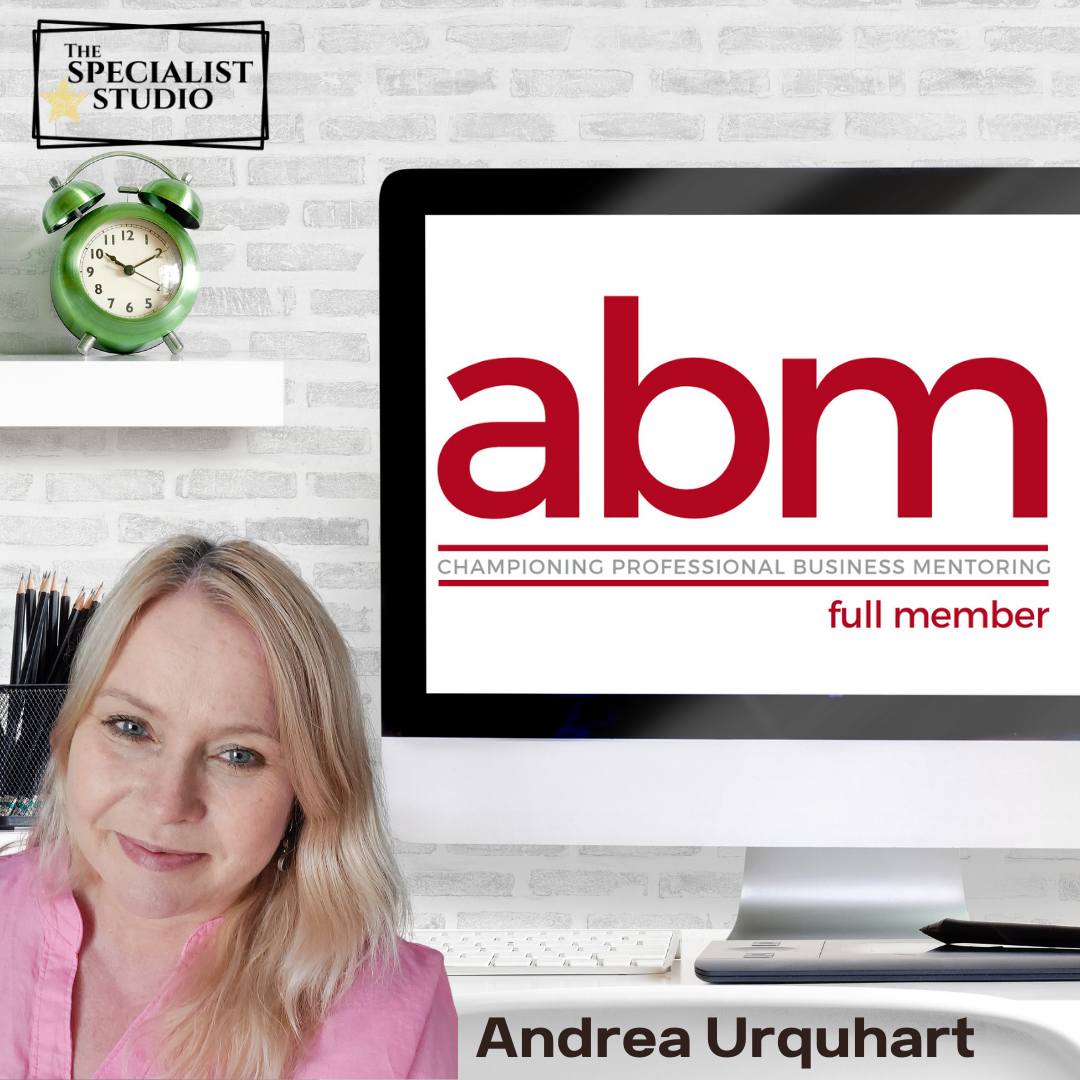Hi, I’m Andrea Urquhart. Welcome to The Specialist Studio, my bespoke business mentoring space for therapists and professional coaches growing their consultancy. Today’s article explores why, as heart-centred professionals, therapists and coaches we often find it an emotional and counter-intuitive process to choose a niche. Read on to discover why niching grows your expert status and influence so that you can help more people on a deeper level and enable you to grow a profitable business that supports the lifestyle you need and the charitable work that is part of your mission.
Why is choosing a niche for your therapy or coaching consultancy so important?
If the thought of niching down causes you to kick and scream, rest assured, there is something absolutely counter-intuitive about picking a specific niche and pursuing it as your life’s work. Most people struggle with the concept. We feel that the broader the net, the bigger the client catch.
In reality though, the more specific the bait and fishing technique coupled with fishing in the right waters, the more likely the catch contains the specific clients we want to help. This is why niching works. It provides a specific solution for specific people at a specific point in their life. That’s why consultants who niche carefully and strategically grow successful consultancies.
It’s most likely that you weren’t thinking about profits and niches when you chose to train as a therapist or do your professional training as a coach. I bet you were focused on wanting to help people, making a difference and feeling fulfilled as you did so. In essence, you are mission-led, service-driven and heart-centred.
Understand though, that mission, service and a big heart doesn’t pay the bills. But a niche mission, a niche service and a big heart focusing on a niche of clients will bring in consistent paying clients and, as you grow in confidence and experience, it can also bring you expert status.
Alongside the hard facts that finance is a basic necessity, consider that if you grow a profitable niche in your business, you can also then afford to work with financially vulnerable people either in that niche or in a different one. Growing your profitable niche can empower you to grow your charitable one.
Realise too, that choosing your profitable niche is the single most foundational decision you’ll make in your business. So why is it so hard to do?
Most therapists and professional coaches have extensive training. We are equipped to help many different types of people in many different situations. We have the knowledge to specialise in different approaches and with different clientele. Our expertise is deep and broad, and specialised. It absolutely goes against the grain of that to say that we will only work with a particular type of person in particular circumstances. And this is one of our problems with niching: We want to save the whole world. Another is that we think we’ll get bored in one niche.
Therapists and heart-centred coaches have a passion to make a difference. In our eyes, the more places we do this, the better. Niching seems foreign to our multi-passionate, multi-gifted, able hearts and minds. But at some point, we have to let logic kick in and realise that in targeting our business to have impact in one specific niche area we can make a greater difference than if we are a general practitioner across many needs. This is not just a financially motivated decision, it’s about growing a depth of knowledge, impact and specialist experience so that you become an expert.
Experts influence. They change the lives of their clients. They influence other practitioners. They have a broad reach, precisely because they are specialists in one area. And that is far from boring – that expertise draws you deeper into a specialist understanding.
Why is choosing a niche so emotional for therapists and coaches?
I meet a lot of therapists and coaches who feel that they have procrastinated about choosing a niche. It isn’t just getting into the logic of why it’s good that is challenging. It can be emotionally challenging too. So, if you feel like you’re going through the mill trying to choose or find yours, know that this is not unusual.
Personally, I had a couple of niche dead ends before I realised that my niche is actually a combination of my different skills, strengths and understanding. It’s obvious now that it’s a good fit for me, but it wasn’t always obvious that this was the niche I should pursue.
Before we continue, let’s just clarify even more what we mean by niche. To do that, let’s first explain target market, because the two are different.
Your target market is a broad description of who you help. It still needs some detail, but it’s basically a category of people. Something like retired teachers or people who are grieving, those who have recently divorced or people who self-harm. Whilst these categories might seem specific, they’re not. Lean into your therapeutic training and you’ll realise that’s obvious – supporting teenage girls who self-harm is going to be a different niche expertise than supporting adult men who self-harm due to PTSD. That’s niche.
Niche is the specific expertise needed to support a defined group of people through a specific problem. You might choose to be a grief expert working with teenagers who have lost a friend or relative to suicide. That’s niche. People who’ve lost someone to suicide is a target market. It might feel weird to think of them as a “market”, so if it helps, swop target market for specialism and niche for your specific expertise. We see this in medical practitioners. An oncologist is a specialist and each one will have their niche area of expertise.
It’s possible for some people to choose their niche incredibly quickly. For others, it’s an exhausting and sometimes demoralising journey. Don’t give up if you feel like you’re going through the latter. Here are a few pointers to open up your thinking.
Your personal journey will influence your niche, but there are many parts to your personal story and the seemingly obvious one may not be the most satisfying.
I’ll give you an example. I have decades of experience parenting, teaching, working with families and children in different nations and circumstances. Plus, I had been a married parent and a single parent. It seemed obvious to most people that I would work with children or families in some way. After all, I was knowledgeable in that area, experienced and had a strong evidence-based, professional skillset from teaching and post-graduate training in positive psychology and coaching psychology to draw on. But inside I really struggled emotionally with it. I just didn’t want to give in. Eventually though, I did. I committed to a parenting niche helping children with behavioural problems and emotional intelligence. And was I happy and fulfilled? No. Did it take off? No. Did I re-niche? Yes.
Now I mentor therapists and professional coaches using a different part of my story: my strengths. I use my coaching and teaching skills, my creativity, perspective and strategic strengths to grow my clients’ clarity, confidence and self-marketing skills. These are all things that are part of my story, just as much as parenting and working with children. And they are deeply satisfying – particularly because they are used as part of my mission to enable therapists and coaches to grow from a place of uncertainty or lack of confidence to clarity and confidence in their expert status. It’s a great fit for me.
My point here is this: Some people go through things in their life and then make it their life’s mission to help other people who are going through that same challenge. You’ll see this in niches involving challenges such as divorce, narcissism, menopause and fertility. And it’s true to say that the combination of bouncing back from that life experience and the professional training to help others do the same is incredibly powerful.
But just because you’ve been through something doesn’t mean you have to niche in that. Equally, you can niche in something you haven’t been through yourself – you do need great passion, knowledge and empathy about that niche to connect with your client though. If you have that, then great!
So, if your obvious story is not your niche, look at your strengths and your passions. Do you have an area of specialism that you feel so passionate and empathetic about that you could make that your mission? Don’t worry if you would need more qualifications. That’s par for the course with therapeutic professions. The more we niche, the more we gather the niche qualifications we need to support that niche.
That’s because choosing your niche is not the end of your journey. It’s really just the beginning of an incredible adventure towards expert status and the satisfaction of deeply impacting lives.
Sometimes choosing a niche gets complicated for us because we’re looking outwards instead of looking in.
Finding your niche is an intensely personal journey. Although some people say that you can nail your niche within 10 minutes (and I think that is possible for more of us than we think), for most of us, there is a lot of reflection that goes on.
Firstly, it’s natural, as mentioned already, to look first at what we’ve been through ourselves. This can be emotional in itself, and just because you’ve been through something doesn’t mean you now owe the universe to support others through it. If that’s your calling, you’ll know it.
Secondly, I think we feel that if we fight something emotionally, it’s probably because we need to do it. That saviour element inside all of us that likes to help fix people seems to kick back at us and make us think we need fixing there. I would disagree with that in terms of niches. If you recoil internally at the thought of a certain niche, take it from me, that’s your gut saying a big fat “NO!”. It’s not for you. That doesn’t mean a part of you needs fixing. It’s just not what you’re going to revel in doing, so don’t do it. Running a consultancy is hard enough, don’t make it a cross to bear by choosing something you really don’t want to do.
Thirdly, don’t confuse fear through lack of confidence with that gut feeling of “No!”. Heighten your emotional awareness and ask yourself this: “If I was confident that I could become an expert in this, would I love to devote my life to this?”. Don’t be afraid to follow a niche that you still need confidence or extra training in. If you’re passionate about it, grow into that dream. Look at the core strengths needed to be empathetic and skilled in that niche. Do you have those as strengths? Are they areas you could develop? Then don’t let fear hold you back.
You don’t need someone else to tell you what niche you should choose. This is a decision you need to make. If the market is saturated with a specialism in your target market, niching is even more important. As a multi-passionate and extensively trained professional, you have a wealth of choices you could make regarding your niche. What’s important for you is that whatever you choose to specialise in deeply interests you and is congruent with your values, beliefs and passion.
Be inspired by others but understand that the secret is to grow your niche uniquely as you
When we consider or choose a niche, it’s natural to look at others who are doing the same or similar thing. This can be inspiring. It can also be soul destroying. Especially if you aren’t feeling super confident in stepping out in that niche.
The important thing is to have a dual activity going on in your mind: Gleaning inspiration whilst growing your personal vision. Here are some pointers:
1. Check out people with similar niches but don’t be intimidated. Instead, analyse. Put on your scientific hat and look at what they’re doing well, as well as what they may not be doing in the same way you would. Look at the strengths of what they do.
2. Analyse the journey that people in your niche go through by looking at the problem you will be solving and how they experience that problem. Do you know enough about their journey yet and the answers they need? How would you personally support them on that journey? What are the key values or markers of how you think they would best be helped?
3. Remember that you can bring all of you to your niche solutions. If you have multiple qualifications, how can these add to your unique niche offering? Many people trip up here by simply looking at their qualification and offering those services separately. Think outside the box, look at the different skills and understanding you have gained in each of those qualifications. Can they blend together in some way to enhance your specific niche offering? You may feel like you are leaving parts of them behind, but the parts you do blend together will be adding to your expert use of those different qualifications for a particular niche.
4. Just because someone in one of your circles has the same niche, it doesn’t mean you can’t serve it too. When you grow a business, your circles will need to continually widen, and you will grow your own network. As long as you don’t go fishing in their client pond that they have carefully cultivated – their Facebook groups and on their pages and posts – and you’re establishing your own pool of niche clients, you need to know that there are enough clients to go around for every therapist and coach. And besides, your style and way of being will be different from theirs. This is where growing your own confidence and brand voice is important. You will reach and serve people who their voice doesn’t resonate with and vice versa.
5. Visualise your personal growth destination instead of imagining whether you can grow your business like “they” do or did. Imagine yourself growing your business. How would you want to grow and serve that niche? What would you bring to your clients and what would that expertise bring to you? This is about visualising your success but also reveals some of the values and principles and activities you want to build your niche around. Visualising “how” is really important. Perhaps “they” have a YouTube channel, but you would rather create a podcast. Maybe they developed their following on social media, but you would rather develop a network through writing and list building.
There are so many different possible combinations of business strategy and growth that you can literally craft your own success uniquely to you. Of course, there will be mistakes and failures and lessons learned, but understand that your niche, once you settle on it, will be truly yours.
Most importantly, whilst settling on a niche is a big decision, know that it should bring you peace, excitement and probably some kind of nervous anticipation. It’s okay to feel that you’ll need support to grow that niche. You’ll want supervision from someone who understands your niche professionally and you’ll need business mentoring from someone who understands therapeutic and coaching journeys, ethics and values alongside how to grow and market your expert status.
Finally, as a caveat, remember that a niche doesn’t have to be forever. You can pivot if you need to, however, once you find that place of peace and excitement for a specific niche and pursue it, you’ll find that you and your business will grow into that dream. Your business model will develop as you grow and it’s highly likely that you’ll end up developing your business in areas you hadn’t initially imagined or thought possible.
And all because you chose your niche and grew your expert status.
Get in touch with me today if you’d like to know more about how you can grow a flourishing coaching or therapeutic consultancy. I work with therapists and professionals growing their own specialist consultancy and expert status. You can work with me on my signature programme 1:1 or in groups of up to 6 coaches. I also offer monthly mentoring options. Typically, my clients gain clients whilst still completing the programme along with gaining clarity, confidence and a big satisfied smile on their face!
Book a call with me via: https://live.vcita.com/site/strengthen
hello@thespecialiststudio.com www.thespecialiststudio.com

Andrea Urquhart
Business Mentor & Coach for Specialist Coaches
Andrea is a full member of the Association of Business Mentors. With professional experience as a teacher and Positive Psychology Coach, she enables mature therapists and coaches transitioning from academia or professional backgrounds to establish and grow a flourishing coaching consultancy.
She’s known for her ability to enable her clients to gain clarity, confidence and clients; growing momentum in their business.
Andrea is based in West Sussex, UK and works primarily online with clients. Her signature programme, Kickstart Your Coaching Consultancy is 10weeks long and available in a small group or 1:1 option.


Recent Comments